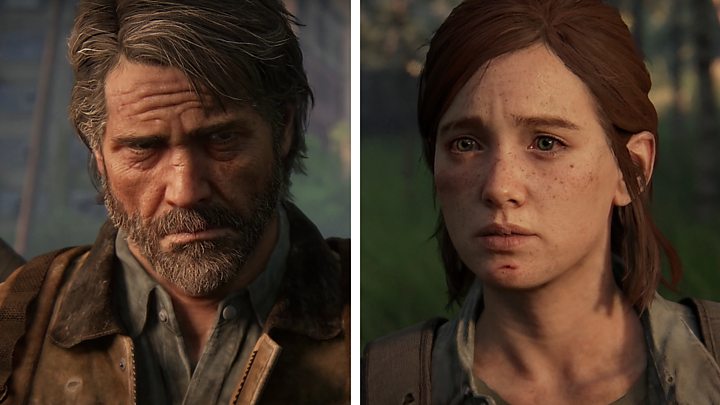
Media playback is unsupported on your device
The first time Steve Saylor fired up the hotly-anticipated new game The Last of Us Part II, he burst into tears.
"Y'all don't even know how much..." he says between sobs in his video of the moment, which has now had nearly half a million views.
"I'm sorry. I don't even know what to say."
Steve is legally blind, and was looking at the overwhelming accessibility options menu.
Courtney Craven, editor of accessibility-focused gaming site Can I Play That, is hard of hearing and has some motor-control issues, and had a similar reaction.
"The first thing I did upon launching [the game] for the first time was FaceTime a friend and cry," she says.
The game has already been dubbed "the most accessible game ever".
It has more than 60 different accessibility settings, allowing an unprecedented level of customisation and fine-tuning.
Every button can be changed, and one-handed control schemes are available by default.
Players like Courtney can turn on direction arrows on subtitles to indicate where the sound is coming from; players like Steve can outline characters and enemies in vivid colours.
'The first time in my life'
Steve, who goes by the name "Blind Gamer" online, has nystagmus - an involuntary eye movement that blurs his vision. Ever since he was a child playing the original Nintendo Entertainment System, he has had to sit extremely close to the screen, and his reflexes haven't always fitted into what modern games expect.
"For the first time in my entire life, I was able to sit back on the couch and play the game without any barriers getting in the way." he says.
"I was able to sit comfortably and play a game just like if my friends were in the room playing with me. And that, to me, was extremely opening. It was emotional."
In the interest of honesty, Steve is keen to let people know that he did consult with the game's developer, Naughty Dog, when they were exploring accessibility issues - but he was never paid for it.
Courtney, meanwhile, suffers from being surprised by enemies that she is expected to hear, among other things.
"So many games have directional audio with characters saying things like, 'over here!'" she explains.
"Hearing players can follow the direction of the voice but I'm often standing there like: 'Uhhh, where is here?'"
A years-long battle
Game accessibility has come a long way in recent years, but gamers largely depend on individual developers to decide how much - or how few - accessibility options to include.
In recent years, a willingness by major developers such as Ubisoft to incorporate accessibility into the early stages of big-budget game design has helped push the subject forward.
In 2015, the Playstation 4 became the first major system to allow re-mapping of controller buttons at a system level, rather than relying on developers to include the option in their games. For many people with motor or dexterity impairments, that opened up the possibility of playing games that may previously have been unplayable.
A watershed moment came in 2018, with the release of Microsoft's Xbox Adaptive Controller - a customisable unit which allowed disabled gamers to use a wide range of assistive devices such as switches and bite pedals. But it only solves problems for those who have trouble using a standard controller.
And big titles still come in for criticism from the community. Activision's Spyro Reignited Trilogy was criticised when it was released without subtitles in its cut-scenes - while CD Projekt Red had to release a patch for blockbuster game The Witcher 3 to enable players to adjust the font size.
It is against that kind of backdrop that many are calling this latest success "the most accessible game ever".
"We're going to look back on this and [see] everything for accessibility before The Last of Us Part II, and after," Steve says.
Courtney, who founded Can I Play That in November 2018 to focus on gaming accessibility, says the effort is unprecedented.
"A lot of games do some of these things. None of them have done all of them until now," she says.
More players, more dollars
She hopes this game will be a blueprint for others to follow - and thinks there are rewards for developers who do.
"I think the monetary payoff will really be obvious," she says. "So many people have told me that Can I Play That's coverage of it was the deciding factor in them buying the game".
But more importantly, she urged people to "make accessible games because you should. It's the right thing to do."
Steve puts it simply: "It just makes their game that much better."
He points to friends without a diagnosed disability who told him their experience was made better by using some of the same options.
And he believes that this is the beginning of a new wave of advancement to come in the next decade.
"Obviously, the more accessible it can be the more that people can play, and that just means more dollars," he says, pointing to a vast untapped audience.
"And as a developer, they want everyone to be able to play their game, so why not make it so that it's accessible to those players?"
https://news.google.com/__i/rss/rd/articles/CBMiLmh0dHBzOi8vd3d3LmJiYy5jby51ay9uZXdzL3RlY2hub2xvZ3ktNTMwOTM2MTPSATJodHRwczovL3d3dy5iYmMuY28udWsvbmV3cy9hbXAvdGVjaG5vbG9neS01MzA5MzYxMw?oc=5
2020-06-21 11:59:34Z
52780856856168
Tidak ada komentar:
Posting Komentar